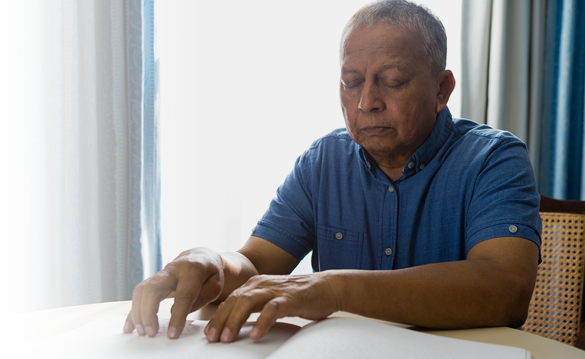On this page:
Preparing for a job interview
Disclosure
Getting to the interview
Personal Presentation
Interview Tips
Preparing for a job interview
Congratulations! You have been invited in for an interview. Your career planning, preparation and job seeking efforts have paid off. You have already impressed them, so there’s no need to be nervous. Think about the interview as just another opportunity to reinforce your suitability for the role. Remember, an interview is a two way street so, it’s also your chance to check them out and assess if this is a place you might like to work.
As always, preparation is key, and a number of new considerations now arise. Probably the most critical is the question of disclosure.
Here is a list of common interview questions that will help you get started.
Disclosure
Depending on your individual situation, you may need to create an open conversation with your potential future employer or recruiter about your vision impairment, and how you will be able to successfully complete the role. Everyday tasks with vision loss can be difficult for some sighted people to comprehend, especially if they have never met a person who is blind or vision impaired before, and this is an opportunity to showcase what you can do in the workplace.
In an interview situation, you have the opportunity to educate and ‘normalise’ the reasonable adjustments you require in the workplace, while keeping the focus of the conversation on the inherent requirements of the role.
Consider whether you are comfortable and confident describing the following:
- Your vision, and how it impacts your ability to undertake work-related tasks.
- Accommodations (and assistive technology that you need to work effectively.
- Strategies and tools you use in daily life to get around and live independently
Create a disclosure script including what you would like to disclose, what you can do (rather than what you cannot do, or find difficult), and how you will complete the role, then practice this with others to get their feedback. Treat your adaptations like a superpower! An interview is a teachable moment to relish so be open and gracious if you choose to disclose in the interview.
Getting to the interview
If the interview is in person, consider how you will get to the interview, and plan your journey ahead of time. If it is a location you have never been to before it may be beneficial to do a practice run beforehand.
If the interview is online, make sure you are familiar with the platform. Is the camera and audio set up correctly? Practice with someone to ensure everything is set up prior to the interview.
Personal Presentation
Your appearance plays a huge part in making your first impression a positive one. Consider what you will wear. If you need assistance with this, there are organisations that can help you, including:
Tips to give you the edge
Confidence is key to making a positive impression at an interview. Confidence comes with good preparation that includes gathering relevant knowledge, and practicing responses to commonly asked interview questions. Here are some preparation tips:
- Learn about the organisation, its mission and values. Check out their website and social media to see what projects they have been working on recently. Think about how your skills could benefit those projects and the organisational values.
- Reread the job advertisement and selection criteria set out in the position description. Match your skills, knowledge and experience to the duties and criteria in dot form.
- Practice responding to commonly asked interview questions with a friend or family member. If you don’t have someone to practice with, record yourself speaking your answers out loud and listen back to refine your responses. Practicing with either of these methods will help you to sound smooth and natural on the interview day.
Interview tips
When you’re in the interview itself, take your time to consider your answers before responding to questions. Don’t be afraid to ask the interviewer to repeat the question if you didn’t take it all in the first time; some questions are long and complex and it’s good to be clear on exactly what is being asked to ensure you provide all of the required information.
Come prepared with some questions of your own. This will show the employer you are interested and have put thought and consideration into the interview.


